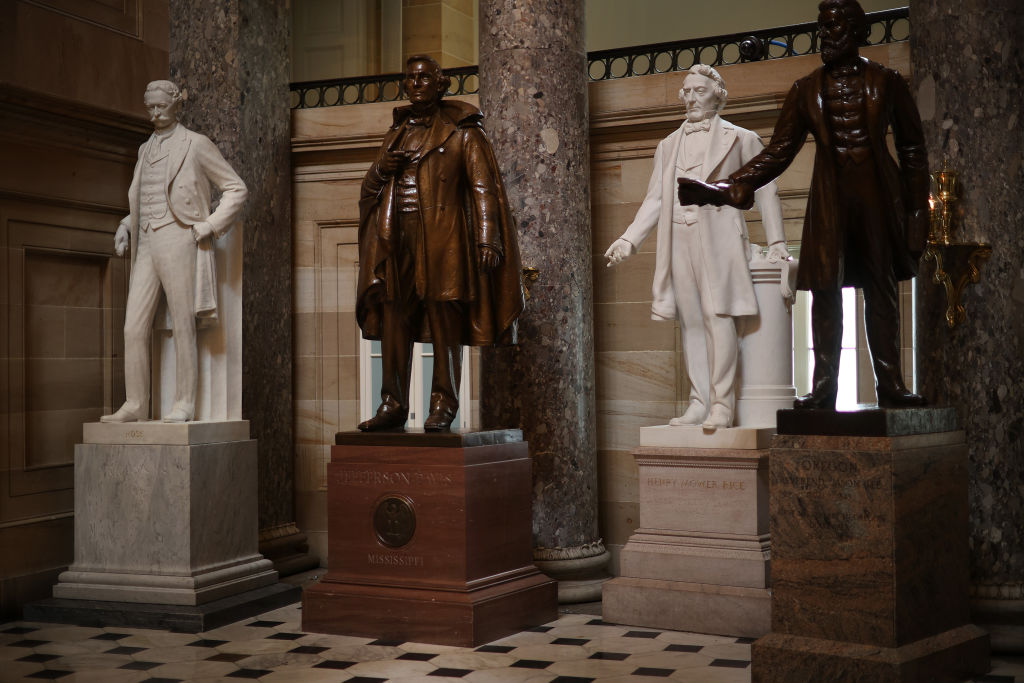House votes 285-120 to remove Confederate and pro-slavery statues from the U.S. Capitol


A free daily email with the biggest news stories of the day – and the best features from TheWeek.com
You are now subscribed
Your newsletter sign-up was successful
The House voted 285 to 120 on Tuesday evening to remove statues of Confederate leaders and other proponents of slavery from the U.S. Capitol. A bust of former Supreme Court Chief Justice Roger B. Taney, a slave owner who infamously wrote the opinion in 1857's Dred Scott v Sanford, would also be replaced in the Capitol's Old Supreme Court Chamber with one of Thurgood Marshall, the first Black justice on the Supreme Court.
"Symbols of slavery, sedition, and segregation have no place in the halls of Congress," said House Majority Leader Steny Hoyer (D-Md.), a sponsor of the legislation.
House Minority Leader Kevin McCarthy (R-Calif.) and Minority Whip Steve Scalise (R-La.) were among the 67 Republicans who voted in favor of the bill, Rep. Elise Stefanik (R-N.Y.), the No. 3 House Republican, was among the 120 Republicans who voted no. McCarthy noted that "all the statues being removed by this bill are of Democrats," and House Majority Whip James Clyburn (D-S.C.) pointed out in return that all the pro-segregation Democrats switched parties after the Civil Rights Act, flagging the late Sen. Strom Thurmond (R-S.C.) as an example.
The Week
Escape your echo chamber. Get the facts behind the news, plus analysis from multiple perspectives.

Sign up for The Week's Free Newsletters
From our morning news briefing to a weekly Good News Newsletter, get the best of The Week delivered directly to your inbox.
From our morning news briefing to a weekly Good News Newsletter, get the best of The Week delivered directly to your inbox.
The bill now heads to the Senate, where it would need 10 Republican votes to beat a filibuster. After the House passed a similar measure last year, 305 to 113, Sen. Mitch McConnell (R-Ky.), then majority leader, did not bring it up for a vote, saying it was up to states to decide the fate of the statues.
Seven of the 12 Confederate statutes are in the Capitol's National Statuary Hall collection, and Congress doesn't have the authority to replace them — since 1864, each state has sent two statues to be included in the collection, and the states have to be the ones to replace them. The House bill would instruct the architect of the Capitol to remove the statues from public view until states send replacements. It specifically mentioned Charles B. Aycock, John C. Calhoun, and James P. Clarke, slavery supporters contributed by North Carolina, South Carolina, and Arkansas, respectively.
Arkansas has already passed a law that will eventually replace Clarke and its second statue, Uriah M. Rose, with statues of Johnny Cash and civil rights activist Daisy Bates, while North Carolina has announced plans to replace Aycock with a statue of Rev. Billy Graham. Virginia has recalled its statue of Robert E. Lee, the top Confederate general.
A free daily email with the biggest news stories of the day – and the best features from TheWeek.com
Peter has worked as a news and culture writer and editor at The Week since the site's launch in 2008. He covers politics, world affairs, religion and cultural currents. His journalism career began as a copy editor at a financial newswire and has included editorial positions at The New York Times Magazine, Facts on File, and Oregon State University.
-
 How the FCC’s ‘equal time’ rule works
How the FCC’s ‘equal time’ rule worksIn the Spotlight The law is at the heart of the Colbert-CBS conflict
-
 What is the endgame in the DHS shutdown?
What is the endgame in the DHS shutdown?Today’s Big Question Democrats want to rein in ICE’s immigration crackdown
-
 ‘Poor time management isn’t just an inconvenience’
‘Poor time management isn’t just an inconvenience’Instant Opinion Opinion, comment and editorials of the day
-
 Witkoff and Kushner tackle Ukraine, Iran in Geneva
Witkoff and Kushner tackle Ukraine, Iran in GenevaSpeed Read Steve Witkoff and Jared Kushner held negotiations aimed at securing a nuclear deal with Iran and an end to Russia’s war in Ukraine
-
 Pentagon spokesperson forced out as DHS’s resigns
Pentagon spokesperson forced out as DHS’s resignsSpeed Read Senior military adviser Col. David Butler was fired by Pete Hegseth and Homeland Security spokesperson Tricia McLaughlin is resigning
-
 Judge orders Washington slavery exhibit restored
Judge orders Washington slavery exhibit restoredSpeed Read The Trump administration took down displays about slavery at the President’s House Site in Philadelphia
-
 Hyatt chair joins growing list of Epstein files losers
Hyatt chair joins growing list of Epstein files losersSpeed Read Thomas Pritzker stepped down as executive chair of the Hyatt Hotels Corporation over his ties with Jeffrey Epstein and Ghislaine Maxwell
-
 Judge blocks Hegseth from punishing Kelly over video
Judge blocks Hegseth from punishing Kelly over videoSpeed Read Defense Secretary Pete Hegseth pushed for the senator to be demoted over a video in which he reminds military officials they should refuse illegal orders
-
 Trump’s EPA kills legal basis for federal climate policy
Trump’s EPA kills legal basis for federal climate policySpeed Read The government’s authority to regulate several planet-warming pollutants has been repealed
-
 House votes to end Trump’s Canada tariffs
House votes to end Trump’s Canada tariffsSpeed Read Six Republicans joined with Democrats to repeal the president’s tariffs
-
 Bondi, Democrats clash over Epstein in hearing
Bondi, Democrats clash over Epstein in hearingSpeed Read Attorney General Pam Bondi ignored survivors of convicted sex offender Jeffrey Epstein and demanded that Democrats apologize to Trump
